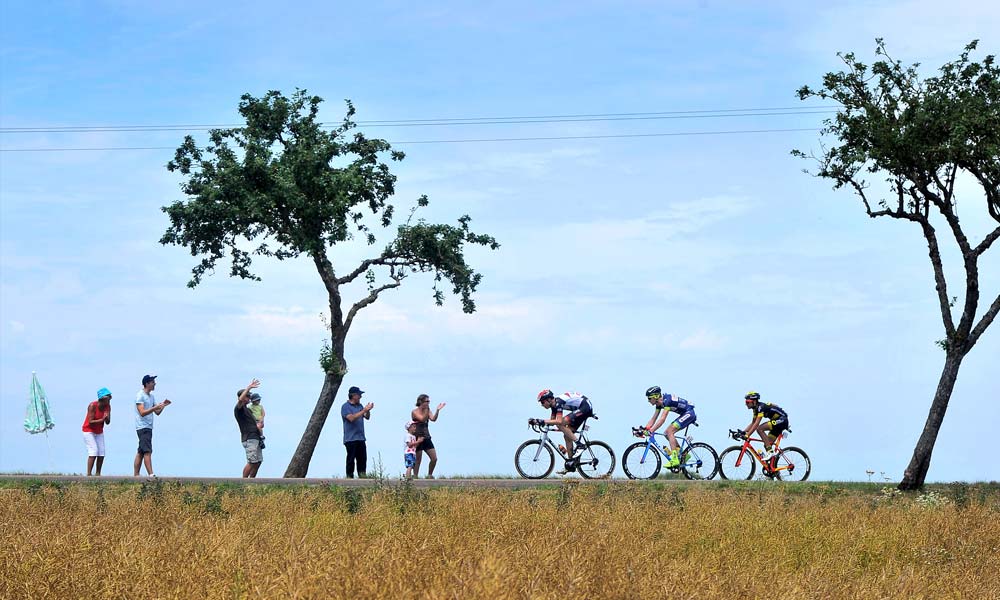[et_pb_section bb_built=”1″ admin_label=”section”][et_pb_row admin_label=”row”][et_pb_column type=”1_4″][et_pb_text admin_label=”Text” background_layout=”light” text_orientation=”left” use_border_color=”off” border_color=”#ffffff” border_style=”solid”]
There is a story on Cycling Central about changing the script of the flat stages of the Tour de France. These are some of the interviews done for that column.
#ToBeContinued
[/et_pb_text][/et_pb_column][et_pb_column type=”3_4″][et_pb_text admin_label=”Text” background_layout=”light” text_orientation=”left” use_border_color=”off” border_color=”#ffffff” border_style=”solid”]
Q&A with Ciro Scognamiglio
RIDE: You’re a veteran and you know the race well. We’ve seen six stages finish and a seventh underway at the moment. And essentially they’re rather boring…
Ciro Scognamiglio: “Yes, for the majority of the spectators, maybe yes.
“They are certainly not boring for the sprinters. In this Tour we have also to consider that we have a lot of sprinters. Certainly Cavendish and Sagan are now not any longer here but there are a lot of them and so, in my opinion, it’s also right that they have a certain amount of occasion.
“As a matter of fact in this last years, the Tour tried to organise a first week that was more interesting. For example, I remember a few years ago when Nibali won the Tour there was the pavé, there was the finish in Sheffield which was a classic…
“This year I have the impression that we came back maybe to the past, the middle of the 1980s and 1990s and maybe there are too many flat stages in this first part – but not only in the first part, also later there will be other flat stages.”
[/et_pb_text][/et_pb_column][/et_pb_row][et_pb_row admin_label=”Row”][et_pb_column type=”4_4″][et_pb_text admin_label=”Text” background_layout=”light” text_orientation=”left” use_border_color=”off” border_color=”#ffffff” border_style=”solid”] [/et_pb_text][/et_pb_column][/et_pb_row][et_pb_row admin_label=”Row”][et_pb_column type=”1_4″][et_pb_text admin_label=”Text” background_layout=”light” text_orientation=”left” use_border_color=”off” border_color=”#ffffff” border_style=”solid”]
Click the SoundCloud file (above) to hear Cico in the press room at Nuits St Georges.
[/et_pb_text][/et_pb_column][et_pb_column type=”3_4″][et_pb_text admin_label=”Text” background_layout=”light” text_orientation=”left” use_border_color=”off” border_color=”#ffffff” border_style=”solid”]
I’m curious if you could think of a way to remedy this situation where you see one or two or three or four guys go up the road and then it becomes escape/chase/sprint. What could be the solution to that on days like this?
“The solution could be to introduce some little climbs, maybe, not far from the finish.
“I don’t want to say a big climb, but maybe a short climb…
“Okay, there is the breakaway; there is certainly the fight for the sprint, but with a little climb – like in Sheffield for example – it could change things.
“Also I would say the big riders for the GC could move if they had a little climb.
“Or, for example, on these little climbs they could introduce a little bonification that could be an incentive for the riders to chase.”
[/et_pb_text][/et_pb_column][/et_pb_row][et_pb_row admin_label=”Row”][et_pb_column type=”4_4″][et_pb_image admin_label=”Image” src=”https://www.ridemedia.com.au/wp-content/uploads/2017/07/St06-LvB.jpg” show_in_lightbox=”off” url_new_window=”off” use_overlay=”off” animation=”left” sticky=”off” align=”left” force_fullwidth=”off” always_center_on_mobile=”on” use_border_color=”off” border_color=”#ffffff” border_style=”solid” /][/et_pb_column][/et_pb_row][et_pb_row admin_label=”Row”][et_pb_column type=”4_4″][et_pb_text admin_label=”Text” background_layout=”light” text_orientation=”left” use_border_color=”off” border_color=”#ffffff” border_style=”solid”]
[/et_pb_text][/et_pb_column][/et_pb_row][et_pb_row admin_label=”Row”][et_pb_column type=”1_4″][et_pb_text admin_label=”Text” background_layout=”light” text_orientation=”left” use_border_color=”off” border_color=”#ffffff” border_style=”solid”]
Click the SoundCloud file (above) to hear Yves in the press room at Nuits St Georges.
[/et_pb_text][/et_pb_column][et_pb_column type=”3_4″][et_pb_text admin_label=”Text” background_layout=”light” text_orientation=”left” use_border_color=”off” border_color=”#ffffff” border_style=”solid”]
Q&A with Yves Perret
RIDE: I’m with Yves Perret who is a veteran of the Tour de France. He used to be a journalist and is now the PR officer for AG2R La Mondiale. I’m asking people in the press room if there’s a solution to stages like this: to stop the escape/chase/sprint formula; is there a way to make it more exciting? What remedy would you have?
Yves Perret: “What we have seen since the beginning of the season is that the most interesting races and stages are shorter. Maybe 200km is too long because it obliges the breakaway to take a long gamble. If you’ve got shorter stages maybe you can have more nervous races and a different scenario, maybe a breakaway with three or four minutes can go all the way…
“But with the mountains coming up, most of the teams aiming for the victory in the Tour de France are totally pleased with this kind of recipe; they leave the sprinters’ teams to manage things.
“I’ve heard some riders saying that it’s quite like a ‘day off’, these kind of stages.”
So five and a half hours of racing in 35 degree heat is a little bit of a ‘holiday’…?
“Yesterday in our team they drank 180 bottles during the stage – so it’s ‘half holidays’.”
There’s still a risk, obviously… we’ve seen flat stages really tear the race to pieces.
“Even during the stage, sometimes long and boring races can have an influence; the attention of the riders is low and sometimes there are crashes.
“I remember two years ago, Jean-Christophe Peraud in Rodez – it was not a mountain stage – and he had a big crash and he was injured for the rest of the Tour because he was not paying attention in the peloton. Someone slowed down, he didn’t see it, he touched the wheel and he crashed.
“For the peloton there is also a risk because it’s so boring; not all the riders are concentrating all day long.”
(More on Romain Bardet, on audio file.)
[/et_pb_text][/et_pb_column][/et_pb_row][/et_pb_section]



